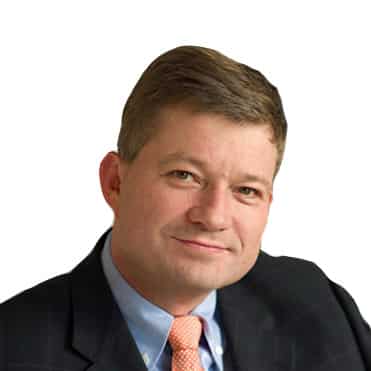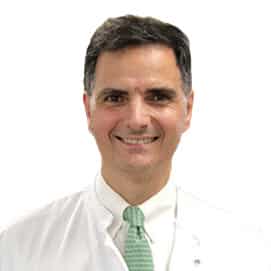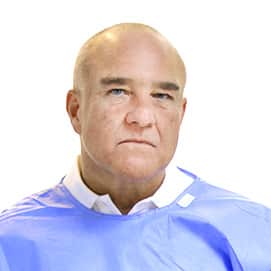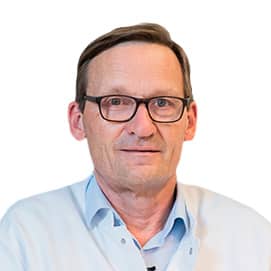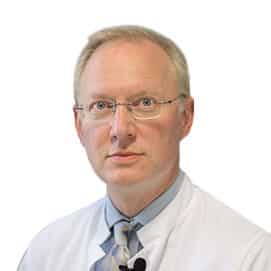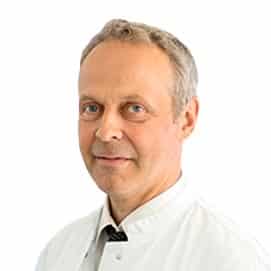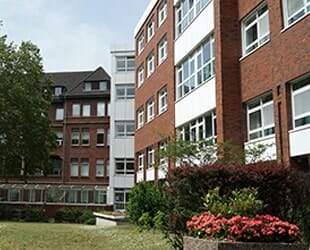Operation
Surgery is the treatment of choice for stomach cancer. Since a cure by only completely removing the entire tumor tissue is possible, the stomach must be - depending on the location and extent of the tumor, as well as the type of tumor - partially or completely removed. During the operation, as a rule, the surrounding lymph nodes must also be removed. This is done for safety, because tumor cells can spread through the lymphatics. In addition, by microscopic examination of the removed lymph nodes, the degree of prevalence of the disease is determined. With a far advanced tumor process in the upper half of the stomach, it may also be necessary to remove the spleen or the lower part of the esophagus.
The most commonly used segment of the small intestine is used as a replacement for the stomach. This segment is so connected to the rest of the stomach or esophagus that no backflow of gallbladder and pancreatic secretions into the esophagus can occur. Recently, in addition, various techniques have been developed that can better compensate for the loss of an organ. For example, with the help of the small intestine, a kind of stomach substitute can be formed, which will take on the function of a food reservoir. Thus, it is possible to lengthen the residence time of food in the gastrointestinal tract.
Completely curative surgery is still not always possible. In the event that a preliminary examination or open examination of the abdominal cavity shows that the tumor has already sprouted all layers of the stomach wall, or the process has spread to nearby lymph nodes, you should first try to reduce the size of the tumor for about 9 weeks (neoadjuvant chemotherapy). In many cases, in conclusion, it is possible to completely remove the tumor process. As a rule, after the operation, chemotherapy is repeated for 9 weeks. Whether the combination of chemotherapy and surgery is justified and necessary is currently being determined within the framework of the oncology conference, i.e., it is discussed and established by doctors of various fields. The task of the attending physician is to discuss with the patient all the pros and cons of such combined treatment.
In the case where there are metastases to the liver, peritoneum or distant parts of the body, a complete cure is no longer achievable. An emergency operation is performed only when complications arise, for example, when a tumor caused bleeding. Instead, the treatment is then carried out with the help of chemotherapy. If the regression of the tumor process can make sense, then the removal of the tumor of the stomach and metastases is preceded by a second review at the oncology conference and discussion with the patient. According to scientific data to date, this seems to be appropriate only if the presence of metastases before chemotherapy is limited to the lymph nodes in the abdominal cavity and if, with the help of an operation performed after chemotherapy, it is possible to completely remove the tumor and all metastases. When the primary operation is performed (without prior treatment), even with the complete removal of the tumor, it may happen that cancer cells remain in the body, which multiply and lead to a relapse. In order to avoid this, if possible, for reliability, in addition to the operation, further therapeutic measures (so-called adjuvant therapy) can be prescribed. In the case of, for example, emergency surgery, when it is not possible to completely remove the regional lymph nodes, additional treatment with chemotherapy and radiation therapy is recommended to reduce the risk of recurrence. Also, due to the better tolerance of chemotherapy by the patient before surgery, compared with its tolerance after surgery, the treatment program within the oncology conference should be determined at the onset of the disease.
What are the consequences of the operation?
Partial or complete removal of the stomach brings with it various consequences, which, first of all, relate to the movement of food and the process of digestion. Appeared complaints are different in each individual case. So some patients, despite the complete removal of the stomach, experience almost no anxiety, others, on the contrary, complain of significant disorders even when part of the stomach is preserved. Possible symptoms are food intolerance, heartburn, lack of appetite, weight loss, abdominal pain, bloating, sticky stools, decreased bone density (osteoporosis). A frequent consequence of the complete removal of the stomach is the so-called "dumping syndrome" (rapid emptying of the stomach). As a rule, over time, the body gets used to the changed conditions. Digestion and body weight often return to normal. Due to the lack of a stomach, vitamin B12 can no longer be absorbed from food. Therefore, it is necessary to replace the vital vitamin through a regular intake from the outside every 3 months (intramuscular injections).
Chemotherapy
Chemotherapy aims to destroy malignant cells throughout the body through drugs that inhibit the growth of these cells (cytostatics). Cytostatics work very well on rapidly growing cells, a property that is especially characteristic of cancer cells. Gastric carcinomas are currently considered to be highly responsive to chemotherapy tumors. True, the cure of stomach cancer by only the introduction of cytostatics is impossible. As mentioned above, at present, however, it has been proven that chemotherapy before (and after) surgery, depending on the prevalence of the tumor process, improves the patient's chances for recovery.
In addition, with a locally advanced process, i.e., in the presence of a completely non-removable tumor at first, in about half of the patients, tumor reduction can be achieved using cytostatics (preoperative chemotherapy). Thus, it may then be possible to completely remove the tumor. For widespread tumors that have already metastasized, chemotherapy aims to reverse or at least temporarily stop the growth of the tumor and alleviate the patient's condition (so-called palliative chemotherapy). However, the treatment is not effective in all patients, so therapy should be carefully monitored and best administered only by physicians experienced in treating patients with gastric cancer.
Antibody Therapy
Various factors act through receptors for cell growth and division - also cancer cells. Receptors, which, like receiving antennas, are located on the cell surface, transmit growth signals further into the cell nucleus. The HER2 protein is also such a receptor that is found on both cancerous and healthy cells. HER2 human epidermal growth factor 2 receptor. If there are few HER2 receptors on the cell surface, the cell receives few growth signals. This means that cell division proceeds normally slowly and in a controlled manner.
All patients should be examined for HER2- status!:
HER2 can be abundant on the surface of a cancer cell. First of all, this applies to breast cancer and stomach cancer. In about 20% cases of gastric tumors, the so-called HER2 overexpression occurs. In this case, HER2 receptors on the cell surface are located close to each other. If HER2 receptors bind to each other (dimensioning), they send signals inside the cell, while the cells begin to divide and multiply. As a result, cancer cells, overwhelmed with growth signals, divide and multiply uncontrollably.
How it works HER2-antibody?
Many years ago, it was possible to create antibodies against HER2-positive breast cancer, directed to the HER2 protein. It has now been found that targeted antibody therapy also works in metastatic gastric cancer. Similar to the "key and lock" principle, the HER2 antibody attaches to the HER2 receptor and thereby blocks it. Growth signals are no longer carried out - cells can no longer divide.
Additionally, the HER2 antibody activates the body's own immune defenses, the cells of the immune system (macrophages) recognize "marked" tumor cells with the help of HER2 antibodies, capture and destroy them. Thus, targeted and effective immune therapy with HER2 antibodies is available for HER2-positive patients.
HER2 antibodies are given intravenously in combination with chemotherapy as an infusion. Side effects with antibody therapy are usually mild to moderate in severity. Some patients may develop flu-like symptoms, such as fever or fever, during or immediately after the first infusion, which are well controlled with appropriate medications. The function of the heart and lungs, if necessary, before and during therapy is regularly monitored in order to recognize possible violations in their work in time and take appropriate measures.
A large clinical study involving many hundreds of patients showed that HER2-positive metastatic gastric cancer can inhibit tumor growth. It is possible to lengthen the time without disease progression and life expectancy.
Radiation therapy
Radiation therapy for stomach cancer is sometimes given if the patient cannot be operated on or if the body does not respond to chemotherapy. Irradiation mainly serves to remove the pain syndrome and is prescribed for the treatment of metastases. First of all, radiation therapy has proven itself in eliminating the problems associated with the presence of bone metastases, which can cause pain and fractures.
After complete removal of the tumor, chemo-radiation therapy serves to prevent the recurrence of the tumor process. True, so far this has been proven only in the case when surgical treatment is limited, that is, an operation without removal of regional lymph nodes. And the effectiveness after complete removal of the tumor and adjacent lymph nodes has not been proven.
In addition, in the immediate vicinity of the stomach are important organs (intestines, liver, lungs, kidneys), which can be damaged by radiation.
Head of the Clinic of Oncology, Hematology and Palliative Medicine
Head of the Clinic for General, Visceral, Thoracic and Endocrine Surgery
Head of the Clinic for Radiation Therapy and Radiological Oncology
Video
Request appointment
Useful links
Photo gallery


